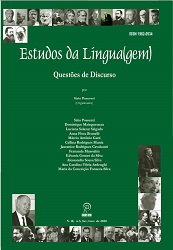In between cognition and discourse: gender stereotypes, woman and politics
DOI:
https://doi.org/10.22481/el.v18i3.7952Keywords:
Pre-discourses; Cognitive-discursive memory; Metaphor; Gender stereotypes; Politics.Abstract
This paper intends to analyse an expression that has stood out in the Brazilian political scene especially: “SHE IS (A) [male Pn] IN SKIRT(S)”, as in “she is a Bolsonaro in skirts”, referring to the Brazilian congresswoman Joice Hasselmann. The analysis are based on the articulation between discourse and cognition as proposed by the category of pre-discourses (PAVEAU, 2013a), conceived as shared frames of beliefs, knowledge and practices that inform discourses both in producing and interpreting meanings. Articulated with considerations on gender stereotypes as primary frames (RIDGEWAY, 2009), the analysis point to the construction of feminin representation in the Brazilian politics strongly connected to the male universe, reinforcing, thus, the duality between public and private spaces, which relegate women to the latter.
Downloads
References
AMOSSY, Ruth; PIERROT, Anne Herschberg. Estereotipos y clichés. Buenos Aires: Editorial Universitária de Buenos Aires, 2005.
BIROLI, Flávia. O público e o privado. In: BIROLI, Flávia; MIGUEL, Luis Felipe. Feminismo e política. São Paulo: Boitempo, 2014, p. 31-46.
BIROLI, Flávia; MIGUEL, Luis Felipe. Feminismo e política. São Paulo: Boitempo, 2014.
EAGLY, Alice H.; KARAU, Stephen J. Role congruity theory of prejudice towards female leaders. Psychological Review, n. 109, p. 573-579, 2002.
FISKE, Susan T. Stereotyping, prejudice, and discrimination. In: GILBERT, D. T.; FISKE, S. T.; LINDZEY, G. The hand book of social psychology. v. 2. Boston: McGraw-Hill, 1998.
LAKOFF, George; JOHNSON, Mark. Metáforas da Vida Cotidiana. Campinas: Mercado de Letras / EDUC, 2002. Edição original: 1980.
LIPPMANN, Walter. Opinião pública. Petrópolis: Vozes, 2008. Edição original: 1922.
MAINGUENEAU, Dominique. Frases sem Texto. São Paulo: Parábola Editorial, 2014.
MOIRAND, Sophie. L’apport de petits corpus à la compréhension des faits d’actualité. Corpus, n.18, 2018. Disponível em: http://journals.openedition.org/corpus/3519 . Acesso em 19 Abr. 2019.
PAVEAU, Marie-Anne. Os pré-discursos: sentido, memória, cognição. Campinas: Pontes Editores, 2013a.
PAVEAU, Marie-Anne. Memória, des-memória, a-memória: quando o discurso volta-se para seu passado. Tradução: Jocilene Santana Prado e Eduardo Lopes Piris. EID&A - Revista Eletrônica de Estudos Integrados em Discurso e Argumentação, Ilhéus, n. 5, p. 137-161, dez. 2013b. Disponível em: https://periodicos.uesc.br/index.php/eidea/issue/view/49 . Acesso em 20 Ago. 2020.
POSSENTI, Sírio. O dado dado e o dado dado. In: ______. Os limites do discurso. Curitiba: Criar Edições, 2002, p. 27-36.
POSSENTI, Sírio. A misoginia como condicionante do golpe de 2016 no Brasil. Discurso & Sociedad, Vol.12(3), 2018, p. 581-593.
RIDGEWAY, Cecilia. Framed before we know it: how gender shapes social relations. Gender & Society, v. 23, n. 2, abr. 2009, p. 145-160.
SILVA, Perla Haydee da. De louca a incompetente: construções discursivas em relação à ex-presidenta Dilma Rousseff. 2019. Tese (Doutorado em Estudos de Linguagem). Universidade Federal de Mato Grosso, Cuiabá, 2019.
Downloads
Published
How to Cite
Issue
Section
License
Copyright (c) 2020 Language Studies

This work is licensed under a Creative Commons Attribution 4.0 International License.

Estudos da Língua(gem) is licensed under a Creative Commons Attribution 4.0 International License.
Authors who publish in the journal Estudos da Língua (gem) agree with the following terms:
The journal Estudos de Língua(gem) maintains the copyrights of the contributions published. These rights include the publication of the contribution and make its content available for free through the portal.







